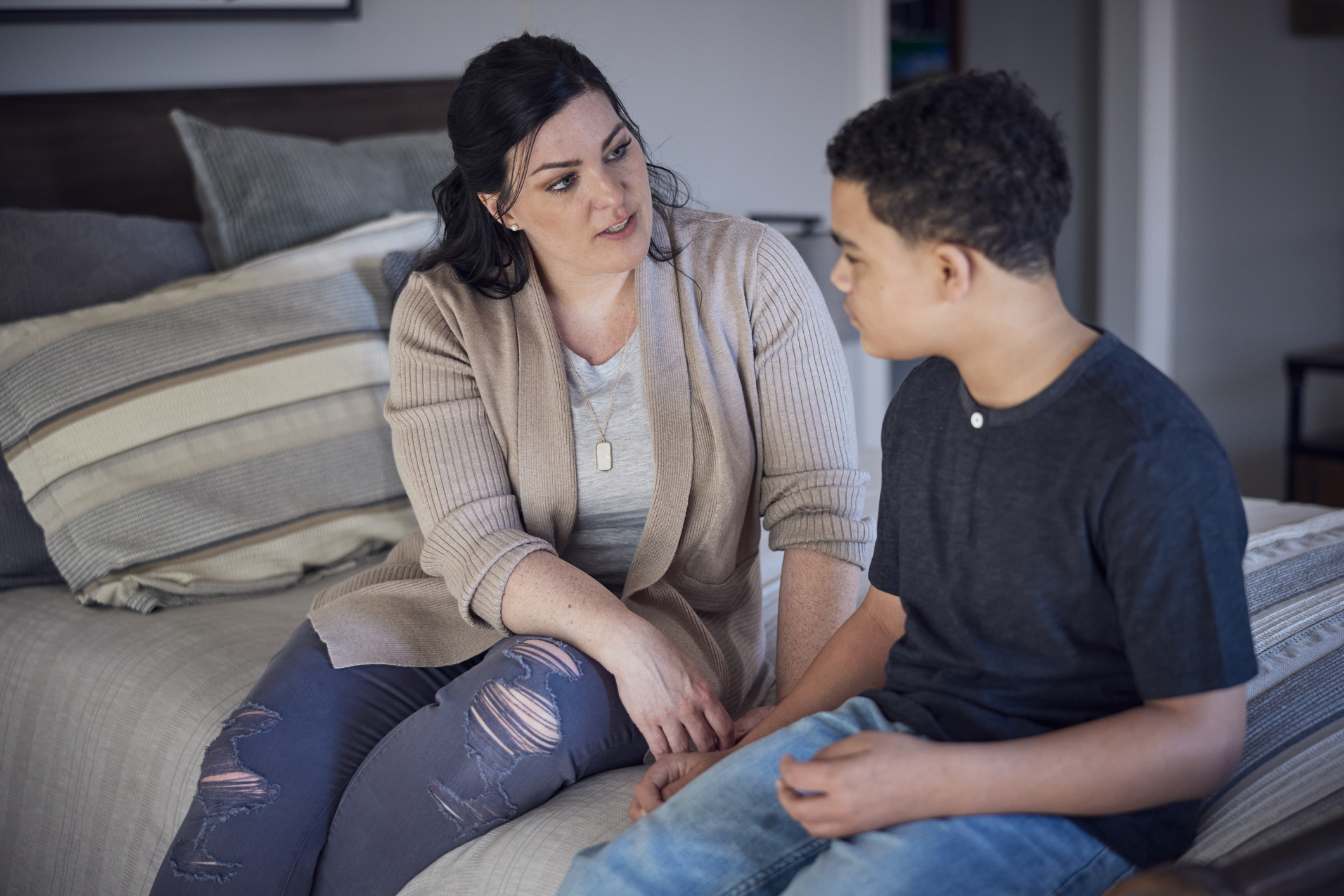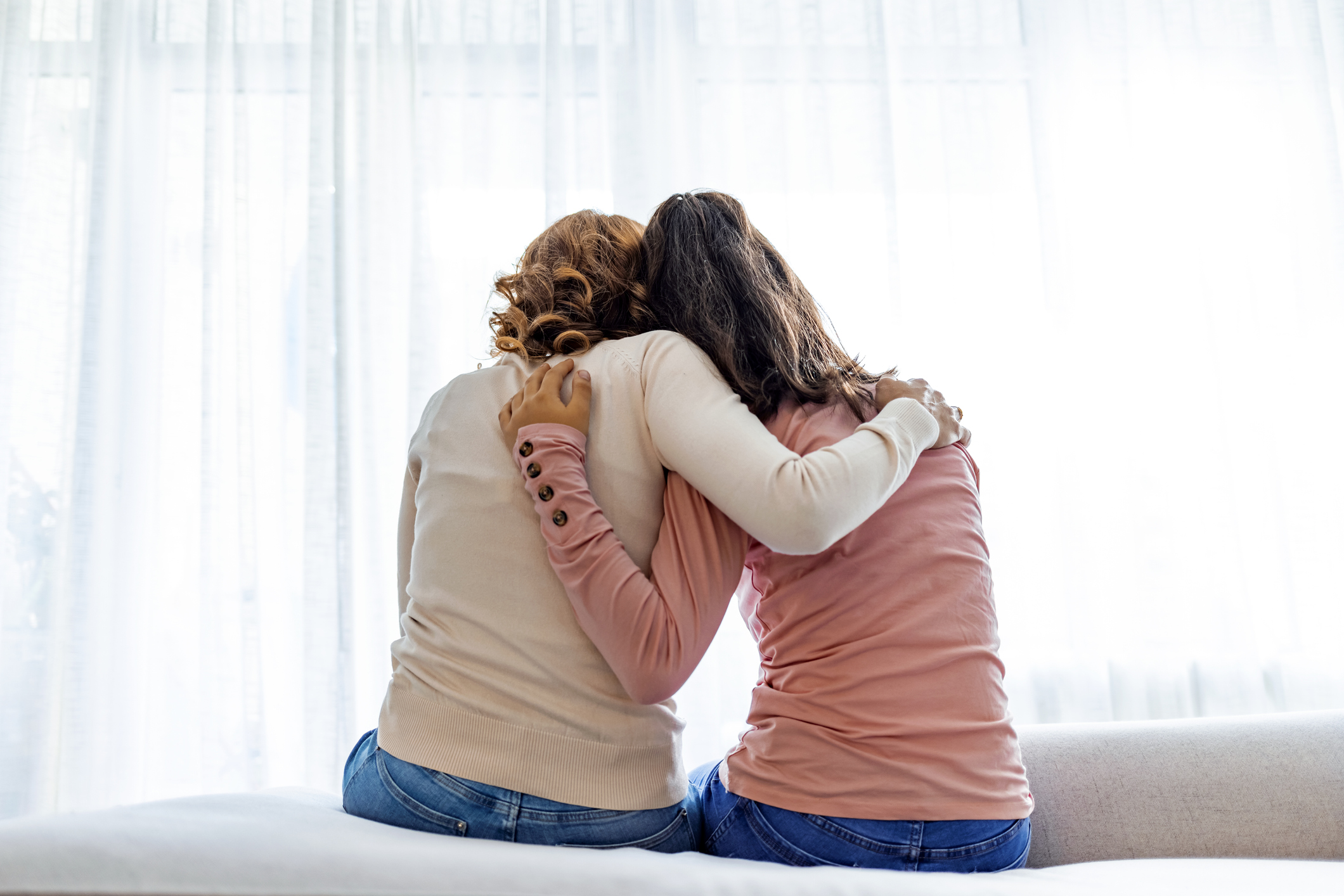Puberty: What it means and what to expect for boys and girls
Puberty is one of life’s more challenging experiences.

Sarah Ockwell-Smith

Parenting advice, hot topics, best buys and family finance tips delivered straight to your inbox.
You are now subscribed
Your newsletter sign-up was successful
During puberty, male and females go through changes as they develop from childhood to adolescence and reach sexual maturity.
Some children will have a relatively easy time of puberty, but, for many, it can be a perplexing – yet sometimes fascinating – time. What arguably makes puberty easier is tolerant, supportive grown-ups. The more parents, guardians, relatives and even teachers know what to expect from puberty, the more they’re equipped to deal with the physical changes and emotional ups and downs – including outbursts, silences and teenage dating – and offer help to their confused or frustrated charges.
“All children will struggle with some element during puberty, but how they cope depends a lot on the support and understanding they receive from their parents, friends, teachers and others of influence around them,” says parenting author and GoodToKnow expert panellist, Sarah Ockwell-Smith – whose highly-rated book Between: A Guide for Parents of Eight to Thirteen Year Olds (Amazon, £12.98) explains the tween years (the time between childhood and teenage-hood) when most kids start puberty. And while it’s not unusual for adults to joke about puberty – in part due to their own embarrassment – a little sympathy goes a long way. “What we really need to stop doing is talking about puberty so negatively and blaming it for any behaviour we do not like from our children,” advises Sarah.
But where to begin? Puberty is a complex transition. A good starting point is being aware of what the signs of puberty are, when puberty starts and ends and – perhaps the most important – how to talk to children about it. Armed with this knowledge, puberty can be a less bumpy journey for both parents and kids.
Puberty: all you need to know
What are the first signs of puberty?
As a general rule, the first stages of puberty occur around 9-11-years-old. Any younger than 8 for girls and 9 for boys is called early – or precocious – puberty. If it’s later than 13 for girls and 14 for boys it’s known as delayed puberty.
Puberty is often referred to as happening in several stages, which usually occur between the ages of 8-15. These stages vary depending on gender, although there are many similarities between boys and girls. “There are physical differences in terms of things like Tanner Stages, which are medical definitions of how boys and girls develop, but even then there is a range,” confirms Sarah.
“Although signs of puberty are the same for most young people, they may appear at a different time, some quickly and some gradually,” explains Paula Wawrzynczyk, an education and wellbeing specialist for Brook. This national charity provides sexual health, education & wellbeing services for young people. Regardless of gender, says Paula, most young people will experience the following:
Parenting advice, hot topics, best buys and family finance tips delivered straight to your inbox.
- Body hair will grow in new places, such as on legs, armpits, genitals and face
- Genitals and the area around them will get darker
- They’ll grow taller
- Hair may get more greasy
- They may sweat more
- Mood swings can be more common
- Muscles will develop
- Nipples might become more sensitive
- Spots may appear on the face and body
- Their voice will deepen
At first, girls may notice the beginnings of breasts or vaginal discharge, or they may have a growth spurt. Boys, meanwhile, may get hairier on their legs, under their arms and around their genitals, or find their genitals are getting bigger. There could also be a shift in their emotional or mental state. “This may mean feeling emotions such as irritability or frustration, or feeling like their mood is much more variable than usual,” says Paula.
Intersex, non-binary and trans children
Intersex children (i.e. those born with both male and female biological traits) are often not discovered until during or after puberty. While rare, the number of intersex people is more significant than many of us realise – it’s currently thought to be between 0.4-2% of the population. One study placed the figure at 1.7% – a similar number (reports the Guardian) as the amount of people born as twins.
It’s now more socially accepted for children to state that they’re non-binary (they don’t define themselves as one gender) or trans (their identity and gender doesn’t correspond with the sex assigned to them at birth). Puberty can be particularly tricky for non-binary or trans children and these kids may be more vulnerable to developing gender dysphoria. “Puberty can be more challenging for gender non-conforming children and it’s important to support them during puberty,” says Paula. If your child is struggling with their gender your GP can refer them to the Gender Identity Development Service (GIDS).
A post shared by I Am For Her Foundation (@iamforherfoundation)
A photo posted by on
When do boys start puberty?
According to the NHS, the average age for boys starting puberty is 12, but anywhere between 9-14 is normal. Boys are less likely to go through early puberty and – if they do – it's more likely to be because of an underlying health reason. “In boys, you should consider consulting your GP if puberty starts before age 9 or after age 14,” says Dr Dring Turner for Brook. While this sounds worrying, it’s usually treatable.
Stages of puberty in boys
Early puberty Boys get taller and will notice that their testicles get bigger and see pubic hair growing at the base of their penis. Their scrotum begins to get thinner and might be redder.
Main puberty stage A year or so after the first signs of puberty, boys will experience more changes. These will continue for the next couple of years.
Boys can expect their penis to grow and lengthen, and testicles will grow and may darken in colour. Pubic hair becomes thicker and curlier and hair may start to grow under their arms and legs. This can be an awkward time for them, as mum of three, Susan from Wiltshire, knows all too well, “It took our son about three years after growing leg hair to wear shorts in front of us again,” she says.
Boys will also experience a growth spurt of, on average, 7-8cm a year. They'll start to sweat more and may develop acne. Their breasts will swell slightly – this is called gynaecomastia and is normal in puberty.
Their voice will get deeper and they might have wet dreams (involuntary ejaculations as they sleep).
Final stage of puberty in boys
After about four years of puberty, boys’ genitals will look more adult-like and pubic hair will have extended to their inner thighs. They may want to shave their facial hair.
Boys stop getting taller at around 16 but may continue getting more muscle. By 18, boys will have reached full maturity.
A post shared by Brook (@brook_sexpositive)
A photo posted by on
When do girls start puberty?
The NHS states that, on average, girls start puberty at 11 but anywhere between 8-14 is normal. Girls are more likely to go through early puberty than boys – while this doesn’t necessarily signal a problem (as genetics often play a part) it’s worth getting it checked out. “In girls, signs of puberty occurring before age 8 or after the age of 14 should probably be discussed with a doctor,” advises Dr Dring Turner.
Interestingly, new research indicates that there was a surge in early puberty in girls during the pandemic. Initially thought to be an effect of COVID-19, it’s now believed prolonged blue light exposure from smart devices played a part. “We have found that blue light exposure, sufficient to alter melatonin levels, is also able to alter reproductive hormone levels and cause earlier puberty onset in our rat model. In addition, the longer the exposure, the earlier the onset,” explained Dr Aylin Kilinç Uğurlu, one of the study’s authors.
Stages of puberty in girls
Early puberty Their height starts to increase by as much as 5-6cm per year and their breasts develop. Their nipples may swell slightly and their ovaries start to grow. It's also normal for some pubic hair to appear, as well as more hair on the legs and arms.
Main puberty stage Girls' breasts continue to grow and become fuller. They may need a bra.
Pubic hair becomes coarser and curlier, and underarm hair starts to grow. They're growing at the fastest rate now – up to 8cm per year. Girls usually reach this stage when they're 12 or older. Some girls might develop hair in other areas of their body such as on their top lip. This is completely natural and it's important to explain this and provide options such as hair removal cream or a dermaplaning tool.
Girls may start to sweat more or develop acne. They will experience another growth spurt – between 5-7.5cm a year for the next two years – until they reach their adult height.

Let your child know that puberty is nothing to be ashamed of.
During this time, girls usually get their first $ period$ . It’s worth chatting about periods when you spot early signs of puberty so they’re not shocked. As mum Susan recalled, “One of my girls thought they were dying when their period started and came downstairs crying.” So, forewarned is forearmed. If you're nervous about starting a conversation, use opportunities such as tampon adverts as an opener.
Increasingly, young girls are using period underwear or a $ menstrual cup$ as an alternative to tampons or sanitary pads. If you can afford to, buy them a selection so they can experiment and discover what they’re most comfortable with.
Girls can put on weight during puberty, which is also common. Their body shape will change and they’ll develop more fat along their arms, thighs and back. Their waist may get smaller and their hips rounder.
Final stage of puberty in girls After about four years the process of puberty will be almost finished. Their breasts will become more adult-like and public hair will have spread. The genitals should be fully developed and they’ll stop growing taller.
How to talk to your teen about puberty
Contrary to popular belief, not all children turn into sullen tweens or teens as a result of puberty. “There aren't any specific psychological signs of puberty,” says Sarah. “A lot of people believe that rising hormones make children sulky, stroppy and overly emotional, but this is not backed up by scientific research. In terms of what is happening in a pre-teen's brain, the development doesn't change dramatically as puberty approaches, it continues at a steady pace that has been happening throughout childhood,” she explains.
What does change, says Sarah, is our expectations of children. “Because they look more like adults we expect behaviour from them that is beyond their years, which often causes lots of stress, anxiety and conflict between parent and child,” she explains. Just being aware of this can make a difference to how we interact with tweens and teens.
Both adults and children can benefit from demystifying puberty, says Sarah, although this can be easier said than done. “A lot of adults were raised to not talk about puberty, genitals, periods, sex and emotions, and tweens can pick up on this uncomfortableness, which perpetuates the awkwardness through generations, so it's a good opportunity for adults to educate themselves and examine their beliefs,” she says. “Avoid just leaving it to school, a book, or friends to explain puberty and related 'difficult' discussions. The only way to control the quality of information they receive is to give it yourself.”
But what’s the best way to go about this? Here’s what Sarah and Dr Dring Turner suggest:
What to do
Teach children about how their bodies develop You can read-up beforehand or with your child if they’re happy to do so. “You might want to talk about puberty from aged 8, but you may feel like this conversation is appropriate earlier – for example, if your child has an older sibling going through puberty,” says Dr Dring Turner.
Try saying: “If there’s anything at all you’d like to ask me about changes that your body will go through/are going through, please do. If not me, someone else you trust.”
Be open Kids often feel embarrassed about their changing bodies but will feel less so if you’re relaxed with yours. As they get older don’t feel like you need to avoid the correct terminology, such as ‘genitals’, ‘penis’ or ‘vagina’ – you may get a few giggles or eyerolls at first but these are the correct words. “Reassure your child that these changes aren’t negative. It might feel strange at first but puberty brings lots of positive changes too,” says Dr Dring Turner.
Try saying: “Your body and mind are going through some perfectly natural changes – feel free to share when you want to.”
Explain that their brain is also developing When they wrestle with their emotions they may wonder ‘what's wrong with me?’, says Sarah. “But if they understood that their brains are very different to adult brains it takes a huge amount of pressure off of them.”
Mum Ella, from Kent, noticed significant emotional changes in her daughter during puberty. “There are plenty of books and articles about girl’s confidence dipping after the age of 10,” says Ella. “Living with it sometimes can leave you absolutely helpless. It can be due to relational bullying, struggling with personal feelings, hormonal changes and physical changes. But what I realised is watching it happen as a parent is nowhere near as intense as it is being the teen living with these feelings.”
Try saying: “It’s fine to feel confusing or strong emotions but if you’re worried or struggling I’m here for you.” Or regularly use positive affirmations to reinforce your child's good behaviour and boost their confidence. For example, credit them if they washed up, were kind to a friend or sibling, or if they cooked for the family.
Be aware that your child will compare themselves It’s only human for children to look at others and wonder why they have something they don’t, so kids need reassuring that there’s nothing wrong with them.
Try saying: “Everyone experiences puberty differently. It’s important not to compare yourself to others,” suggests Dr Dring Turner.
A post shared by Matthew Syed (@matthewsyedauthor)
A photo posted by on
What NOT to do
Use stereotypes Telling boys to ‘man up’ or accusing girls of being hormonal isn’t helpful, so avoid gender stereotypes and don't presume puberty is easier for one gender than the other. “Puberty is a transition for all children – they are all different – there is no reason why it should be universally easier, or harder, for boys or girls,” says Sarah.
Try saying: “It’s ok to feel this way. I’m here for you.”
Blame hormones “There’s a tendency to blame testosterone for making boys behave in 'boisterous' or difficult ways and oestrogen for making girls sulky and moody; however, there is little research to support these beliefs,” says Sarah.
Try saying: “Is there anything I can get you to make you feel better?” Or encourage exercise, which releases calming, mood-boosting endorphins.
Comment on their developing body Children can be very self-conscious and even gentle teasing can feel like a dig. “Mention often that they’re able to come to you if they’re worried about their body,” says Dr Dring Turner.
Try saying: “Your body is going through some perfectly natural changes. If you need any toiletries or clothes, don’t be afraid to ask.”
Presume you know their sexual orientation “Your child needs to know they can come to you if they are gay, lesbian or bisexual and they won’t be ridiculed or judged,” says Dr Dring Turner.
Try saying: “We love you and hope you can talk to us about having a boyfriend or girlfriend when you feel ready.”
Hygiene
It’s also important to discuss hygiene with your child – preferably when they’re old enough to wash themselves so they get into the habit of regularly washing their armpits and genitals. Check in every so often to see that they’re doing this and that they’re brushing their teeth twice a day. Not only will this keep them clean and prevent infections, it will also help them avoid giving off odours. It also helps to stock up so what they need is in the house without them having to ask every time. As mum Susan said, “I think every teenager needs to be told why it's important to use deodorant. My children now call my bathroom drawers ‘Superdrug’ as they go in and borrow razors, deodorant and Tampax.”
You will want your children to avoid getting sore down below, too. “It’s important that the genitals are kept clean. It’s best to wash the genitals with warm water or unperfumed soap. Penises need to be cleaned under the foreskin, as does the clitoris,” says says Dr Dring Turner.
She adds, “Vaginal discharge helps the vagina stay clean, and the smell and consistency change throughout the menstrual cycle – let your child know that if these change and it’s not because of the menstrual cycle, they should tell you so you can help them see a doctor as this can sometimes be a sign of vaginal infections.”

During puberty children will start to consider their sexuality.
Sexuality
Children often start masturbating or having erections earlier than parents realise, so the best way to make these conversations less awkward is to start them as early as possible, advises Dr Dring Turner.
"Children may display healthy sexual behaviours, including masturbation, before puberty, she says. “This might be a chance to talk about the positives of touching our bodies, but also to reinforce messages around privacy. By having honest conversations, your child should feel that they can ask you questions about things that are happening to their body, and that there isn’t anything shameful or embarrassing.”
Dr Dring Turner continues, “Again, aim to discuss erections and wet dreams before they might happen, and in a matter-of-fact way. Involuntary erections are perfectly normal, and can happen at any time of the day and night. For example, say ‘Sometimes during puberty, your penis might get hard, this doesn’t mean anything’s wrong, but it might feel a bit embarrassing if you’re at school, so you might want to go to the toilet until it stops’. Similarly, explain that wet dreams are nothing to worry or be ashamed about. Prepare your child – for example, teach them how to take the sheets off their bed and put new ones on so they don’t have to ask you and they feel more in control.”
You may also get asked about sex or contraception. This can often come as a surprise to parents or caregivers, but it’s better if kids are educated on these subjects so try not to look too shocked. “My tween asked us the other day if condoms were multi-use. We said no, and then his next question was whether they were biodegradable! Tweens think about single use plastic in a way I never have,” says mum Rachel, from London.
What’s essential is that children know that any touching or sexual activity should be consensual, and they should feel happy and safe, says Dr Dring Turner. Although the age of consent in the UK is 16, there are sexual health services for people under this age.
“It’s important that, whenever they choose to have sex for the first time, young people feel ready. This might include discussing contraception or signposting them to places where they can find this information, such as Brook or the NHS,” says Dr Dring Turner.
When does puberty end?
Puberty usually lasts around four years, so the earlier a child starts puberty, the earlier they’re likely to finish it.
Boys who have reached the final stage of puberty will have adult-looking genitals, more pubic and facial hair and possibly more muscle. They usually reach full maturity by 17 or 18.
Girls who have reached the final stage of puberty will have a more woman-like figure (fuller breasts, rounder hips) and will have stopped growing taller.
Once teens have gone through puberty they will look and act more grown-up. But at this stage teenagers are still adolescents. Some experts believe that teenage-hood is more of a social construct, and studies have shown that adolescence actually carries on into our twenties – for example, our brain’s white matter continues to increase, says an article by the BBC – so it helps to be mindful of this when dealing with your kids.

Just being there can be enough but if you're worried about your child there's help out there.
Support for parents, tweens and teens
Puberty can be a time of highs and lows and some tweens and teens will manage better than others. “To best support your child, keep the conversation open and let them know they can always talk to you,” says Dr Dring Turner.
But sometimes your support and advice may not be enough. If your child is struggling you may notice the following:
- Increased anger or irritability
- They become withdrawn
- They need more/less sleep
- Reduced or increased appetite
If you think your child is showing signs of depression, anxiety or other problems such as an eating disorder, they could benefit from some extra help. If you’re worried, speak to your GP or check out the following resources:
NHS Mental Health Services: GPs can refer kids to CAMHS but, sadly, there’s a long waiting list. If you can afford private therapy for your depressed or anxious child, please do consider it. The British Association for Counselling and Psychotherapy (BACP) can help you find a children’s counsellor.
Mental health charities
· Mind
· Shout
Sexual health and wellbeing advice
· Brook
Further reading/listening:
The Boys Guide to Growing Up, by Phil Wilkinson (£6,38 Amazon)
The Girls Guide to Growing Up, by Anita Naik (£5.94, Amazon)
How to Grow Up and Feel Amazing: the No Worries Guide for Boys, by Dr Ranj Singh (£6.99, Amazon)
You Are Awesome, by Matthew Syed (£7.43, Amazon)
Between, by Sarah Ockwell-Smith (£11.55, Amazon)

Sarah Ockwell-Smith is a well known parenting expert and a highly regarded popular childcare author who specialises in the psychology and science of parenting, ‘gentle parenting’ and attachment theory. She has authored 13 parenting books, translated into over 30 languages, which have sold almost half a million copies.

Debra Waters is an experienced online editor and parenting writer. She also has a strong background on health, wellbeing, beauty, and food. She currently writes for Goodto and Woman&Home, and print publications Woman, Woman’s Own, and Woman’s Weekly. Debra has written for What to Expect, Everyday Health, and Time Out. In addition, she has had articles published in The Telegraph and The Big Issue.
- Sarah Ockwell-SmithTween and teen expert and author